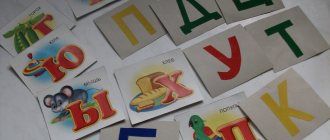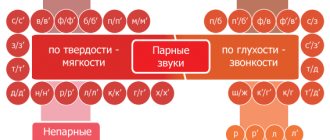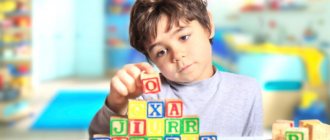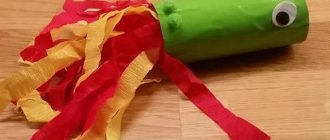- home
- Speech development
A child normally begins to pronounce the sounds [L] and [L] correctly from the age of 3, and differentiate between the soft and hard version from the age of 3.5.
If parents notice pronunciation problems or confusion of sounds, it’s time to get down to business themselves or seek help from a speech therapist. Let's consider the differentiation of sounds [l], [l] in poetry, texts, and game exercises. The production and automation of sounds [l], [l] should be carried out from the age of 4. Classes should last no more than 20-25 minutes. Do not try to teach children to speak correctly with the help of strict lessons, focus on games: labyrinths, pictures, riddles, poems, educational texts. Start each lesson with articulatory gymnastics on the sound [l] for the muscles of the tongue, cheeks, and larynx. Simple exercises help children get ready to work with a speech therapist and keep their speech apparatus in good shape.
Exercises
Let's start with classic exercises that are designed for children of preschool and primary school age. A professional speech therapist and a parent can conduct classes on this list of games at home.
Syllables
This is reading or repeating syllable tables. You need to do the task for 2-3 minutes several times during the day.
In direct syllables:
| LA LA LA | LE-LE-LO | LU-LU-LU | LI-LI-LY |
| LA LA LA | LO-LO-LE | LU-LU-LU | LY-LY-LI |
| LA LA LA | LO-LE-LO | LU-LU-LE | LY-LI-LY |
| LA LA LA | LE-LO-LE | LU-LU-LU | LI-LY-LI |
In reverse syllables:
| AL-AL-AL | OL-OL-OL | UL-UL-UL | EUL-EUL-EUL |
| AL-AL-AL | OL-OL-OL | UL-UL-UL | YL-YL-YL |
| AL-AL-AL | OL-OL-OL | UL-UL-UL | YL-YL-YL |
| AL-AL-AL | OL-OL-OL | UL-UL-UL | EUL-EUL-EUL |
The next step is to add another consonant or vowel to the syllable:
| PLAH-PLAH-PLAH | PLE-PLOE-PLO | PLU-PLU-PLU | PLI-PLI-PLI |
| PLA-PLA-PLA | PLO-PLO-PLO | PLU-PLU-PLU | PLY-PLI-PLI |
| PLA-PLA-PLA | PLO-PLO-PLO | PLU-PLU-PLU | PLAY-PLI-PLAY |
| PLAH-PLAH-PLAH | PLE-PLO-PLOE | PLU-PLU-PLU | PLI-PLI-PLI |
| ALA-ALA-ALA | OLE-OLE-OLO | ULU-ULU-ULU | YLI-YLI-YLY |
| ALA-ALA-ALA | OLO-OLO-OLO | ULU-ULU-ULU | YLY-YLY-YLY |
| ALA-ALA-ALA | OLO-OLO-OLO | ULU-ULU-ULU | YLY-YLY-YLY |
| ALA-ALA-ALA | OLE-OLO-OLE | ULU-ULU-ULU | YLI-YLY-YLI |
It is important not to rush when reading syllables, but to monitor the clarity of the pronunciation of the sound, its softness and hardness.
Words
Use open and closed syllables in words to create speech therapy cards. Form examples in rows of 3-4 pieces each:
Dust - dust - bullet - they sang.
Lyalya – Lolla – Lika – Lena.
Syllable – elephant – clone – full.
Varnish – flag – fist – bench.
Soaped - lathered - washed - swept.
For a number of words, it is important to select examples that sound similar in sound so that the child develops phonemic awareness.
Collocations
The preschooler slowly repeats word combinations after the teacher; increase the complexity of the examples at each lesson, but gradually. If the child cannot cope, does not repeat the words clearly, return to the previous level and practice the material already covered until it becomes automatic.
School ball; Green meadow; Favorite carrot; Toilet soap; Cold floor; Ice puddle; Warm summer; Caught a moth; Ate a lemon; Forest lily of the valley; Gold ring.
Offers
For preschool children, it is enough to include 3-4 words in sentences for repetition.
Our Julia is a fidget. Kolya has a flag. There is a quinoa in the clearing. Planes are flying far away. Kolya pricked stakes. There is an ear in the fist. Lolla and Lika divide everything in half. There is a deer in the field.
On a note! Invite your child to put together sentences independently from the pictures, and then repeat them. For example, put the following set of cards on the table: lemon, elephant, and the written verb loves. It turns out that the elephant (does not) like lemon.
Puzzles
Interesting riddles must not only be guessed, but also memorized.
I dug the ground, I wasn’t tired at all. The one who dug for me is tired. (Shovel)
White on white, trampled where he ran. The red-haired one will pass by and read the tracks. (Fox and hare)
Here are the pins and needles crawling out from under the bed. Their eyes are looking at me, they want to ask for milk. (Hedgehog)
Poems
Poetic texts are an effective method of eliminating speech disorders in children of different ages. For preschool children, suggest learning 1-2 quatrains and large rhyming sketches at least once a week.
It's raining! Drops are dancing in a puddle! The raft is floating! Nobody needs! The little frog climbed onto the raft! And yells: “Hurray! Forward!".
I love blueberries, I love strawberries, I love viburnum, I love strawberries.
There was a blue sky, There was a golden sun, A dog was lying on the porch, A guy was planting a tree. It was quiet and warm. Time passed slowly.
Do not forget to explain to children the meaning of unfamiliar words in poems, texts, and other exercises.
Proverbs
Small proverbs should be read or repeated after an adult:
- Even a small lie leads to a big one.
- Drop by drop the stone is chiseled.
- Don't boast about the beginning, boast about the end.
- The finger is weak, but the fist is strong.
- Finished the job, go for a walk safely.
- The little wolf will shed the tears of a sheep.
- Not all that glitters is gold.
- Slipped is not a fall yet.
After reading proverbs, talk with children about the meaning of the phrase, choose instructive and interesting examples according to the age of the students.
Tongue Twisters
It is better to write pure sayings in a notebook and memorize them. Advise parents to recite such sentences with their child during a walk, before bedtime, or in chorus with the whole family, so as not to turn the game into a strict lesson.
- The nightingale is small, but the voice is strong.
- Lena barely ate; apparently she didn’t want to eat out of laziness.
- And I was there, I heard that story.
- Galya wet her felt boots in the thawed patch. Galenka’s felt boots are drying on the heap.
- Being a housewife is not easy, the milk has run out.
- The linden tree has a linden leaf, the linden leaf is healing and the linden leaf is sticky.
- Right at the shallows we found a large burbot.
Stories
The task involves retelling close to the test. For preschoolers, choose short texts of Russian folk tales and instructive stories.
Masha
Masha was little, but she wanted to grow up faster. I decided to help my mother around the house in order to grow bigger faster. I walked in my mother’s shoes, put on her dress, but nothing helped.
One day Masha decided to sweep and wash the floor. Everyone was happy and surprised. Masha did everything well, and her mother asked: “Masha, have you really become so big that you can wash and sweep the floor?” And dad said: “Yes, but we didn’t even notice that our Masha had grown so much! Now we’ll call her big!”
Automation of the sound "Ль"
Automation of the sound Ль in syllables.
La-la-la Le-le-le Lu-lu-lu Li-li-li al - ol - ul - yul yal - yul - yul - il yal - yul - il - yul ol - yol - al - yul al - yal - ul - yul yl - il - spruce - al
Automation of the sound Ль in syllables.
LA Fields, Lala, strap, walk, glade, hodgepodge, goulash, stroller, Olya, Julia, Ulya, Valya, Kolya, Fields, Tolya, Galya, will, bullet, week, sawing. LEE Lisa, leaf, elevator, linden, shower, burbot, valley, viburnum, Polina, raspberry, snail, Fox, face, lemon, street, rabbit, slept, sat, stood, knocked, walked, wrote, read, swing, ran , left, ran over, stomped, pelican, giant. LE Lion, lei, forest, climb, left, watering can, tape, swan, fishing line, ladder, ticket, roll, deer, pour, left, knee, log, spare, iron, cart, seal, grocery, field, beehive, wheel , lie, fly, glacier, forester, treat, cake, winch, ice drift, LE Ice, flax, Leva, Lenya, Lesha, light, pilot, flight, distant, wheels, diaper, herring, green, salty, coal, wallet, moth, wick, airplane. Lyu Kolya, command, saw, grind, salt, hatch, Lyuba, people, buttercup, prickly, prick, grind, aim, pole, jaw, pet.
Automation of the sound Ль in pure tongues.
La-la-la, la-la-la - in the poplar alley. Lu-lu-lu, lu-lu-lu - I cut wood with a saw. Le-le-le, le-le-le - there is a lamp on the table. Li-li-li, li-li-li - the cranes flew in.
Automation of the sound Ль in phrases.
Liver sausage, railroad, hungry dog, ball gown, school notebook, straw hat, butter, table lamp, ripe lemon, sweet candy, shaggy poodle, white swan, cold summer, brave people, cheating fox, white bread, warm coat , White Lily. basketball court, little wolf cub. yellow leaves.
Automation of the sound Ль in sentences.
Lena has a watering can. Galya and Olya were running. Leva and Kolya were sitting. Kolya is stronger than Tolya. Lenya climbed the linden tree. Far, far away the bell is ringing. Olya waters the lemon. Lida loves lemonade. Lenya sculpts from plasticine. Leva's teeth hurt. Little Olya is lying in a stroller. Lisa's left knee hurts. Valya and Galya were sculpting swans. The plane flies over the clearing. Little foxes ran after the fox. Every day I water the sticky poplar from a watering can. We planted these poplars and lindens ourselves. These maples and lawns were watered themselves. Look at the little owlets - the little ones are sitting side by side.
Automation of the sound Ль in connected speech.
Our hands were covered in soap, We washed the dishes ourselves. We washed the dishes ourselves and helped our mother. V. Lifshits Valenki Valenka's felt boots are not big, not small. They fell into the snow, but didn’t fall off their feet. I. Zhukov Little Frogs Five green little frogs are in a hurry to rush into the water - The heron got scared! And they make me laugh. I’m not even a little afraid of this heron! A. Barto Alena and Polya. Alena and Polya went to the clinic. Then they walked in the clearing near the clinic and wove wreaths. Then they bought bread, waffles and lemons.
Exercises
Differentiation [l], [l] will be more productive if you approach classes as a game. L.A. Komarova developed an original method of individual and group work with preschool children with speech disorders. This method is based on games with cards and flat toys (walkers). Kindergarten children hold a pointer or a Kinder toy in their hands, use auxiliary elements to navigate through cards with pictures, and complete tasks from a teacher or parent.
Puzzles
Adults name the characteristics of objects (external, taste, any others), and the preschooler guesses its name. In this case, the child is presented with options for the correct answer in pictures. For example, the teacher says: “Yellow, sour, oval...” (lemon). The baby points to an object and names it.
What's missing
Exercise develops memory and attention. Place a large card with images of objects on the table (no more than 9 pieces, you can start with 3-4 pictures). The child looks at the card and remembers that it shows 1-2 minutes. Then the teacher covers 1 picture, and the child says what is missing from the field.
Guessing game
The teacher names the verb, the child selects a noun for it, choosing objects or living creatures in the picture. For example: a swan swims, a river flows. The kid pronounces the entire sentence.
Echo
The game develops memory, speech, attention. There is a card on the table, the teacher names 3-4 items in turn. The child remembers the chain and repeats, highlighting the sounds [l], [l]: lion, forest, watering can.
Wizard
An adult has a magic wand (pointer) in his hands. We touch the pictures and change the category of the word by number:
lion - lions; watering can - watering cans; swan - swans; tape - tapes.
First, the baby listens, then completes the task independently, helping himself with a pointer.
My, my, mine
The child receives pictures depicting different objects, possibly pairs. The teacher sets the following task: name only those images about which you can say mine, mine, mine. The preschooler not only shows and names the object depicted on the card, but also composes word combinations according to the example:
my book; my table; my shoes.
get it by youself
The teacher asks questions about an animal or object that is familiar to the child and shows it in the picture. The preschooler's task is to come up with the maximum number of answers. For example, what kind of snail? - small, brown, slippery, horned, and so on.
Flappers
In front of the kindergartener lies a labyrinth of pictures. Task: show objects one after another using an arrow, name them by syllables and count the number of syllables by clapping your hands. When the child finishes the training, the teacher claps one of the words, and the preschooler needs to guess which word the teacher meant.
Say the word
We continue to work with mazes of pictures. Place another set of pictures in front of your child. The teacher says the beginning of the sentence, and the child finishes using the name of the objects from the maze. For example, they give milk...cows.
Detective
A preschooler needs to search for a word according to its sound pattern. For example, a speech therapist thinks of the word goat. Lays out his diagram in front of the child with colored chips, the child analyzes the information and assumes what was planned.
Kids
We are working with a labyrinth. A preschooler needs to change words using the big-small analogy:
phone-telephone; stroller - stroller; cutlet-cutlet.
Find the odd one out
The kindergartener needs to find an extra element among the pictures with images of objects and explain the choice.
For example, duck, goose, rooster, eagle owl. The odd one out would be the eagle owl, because it is a wild bird, and the rest are domestic birds.
As an additional task, ask your child to pronounce the names of all objects, focusing on the pronunciation of sounds.
Fun account
Simultaneously with differentiating the sounds [l, [l], the preschooler learns to count to 10 and back. Place pictures of several objects on one sheet of paper on the table. As an additional task, ask your kindergartener which flowers are more in the bouquet and by how many.
Guess
The task develops logic, attention and general outlook. On the table there are pictures depicting objects, products, living creatures and cards with written verbs: eat, goes, flies, rides. Task: connect verbs with objects.
For example, a car or a bicycle is driving; eat raspberries, strawberries; a swan floats, a boat.
On a note! Create a diverse speech therapy library so that your child is interested in completing one task several times.
Associations
The game is similar to lotto. The kid looks at two cards with 6-8 images. Task: connect matching pictures in pairs:
beach and swimsuit; gas stove and plate; bread and bread box.
When performing exercises using speech material, it is important to monitor the clarity of pronunciation of phonemes. Don't be afraid to stop your preschooler and ask him to repeat the word again.





